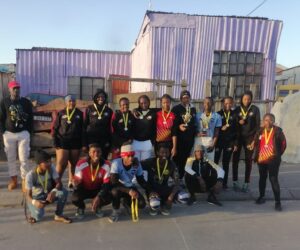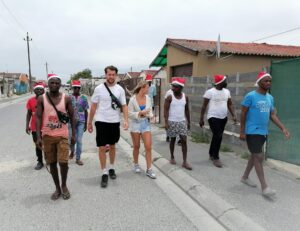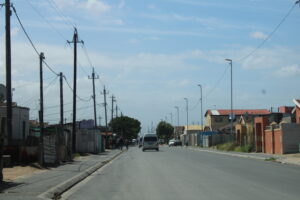
By Isibane Development Initiative
Mzulungile Cabanga and Azola Ngondo are co-founders of Isibane Development Initiative (DI). They come from the rural side of Eastern Cape, eCala and Komani; they were both raised by their grandmothers and parents. They moved to Cape Town in the 90s and early 2000s, this where they started to misbehave in high school. The lifestyle of the urban area, particularly the township exposed to a life of drugs and crime. They too got pressured and influenced in this lifestyle, where they ended up using substances and being in conflict with the law.
After “ukoluka” (Xhosa traditional initiation school) which is an important Xhosa men rite of passage, they were guided and equipped by other Xhosa men about the qualities of manhood: to critically think of one’s actions and its consequences, to be responsible, to be respectful to others, how to be a family man, how to treat women and how to navigate life in general. After this they decided to use their life journey and lessons to empower other youth in their community because they do not want the repeat of the same cycle.

Their organisation, Isibane Development Initiative (IDI) is an organisation that was established in 2016 and registered the same year. The idea behind the opening of the organisation was to gather children between the ages of 12 – 16 years old to try and use sport to influence them against drugs, gangsterism and crime which we felt was getting beyond control in Site C and started in their teens.
We felt this was necessary because the only role models found in the community were criminals and there was no alternative for these children to look up to. It was later discussed that perhaps we also need to create platforms for dialogue amongst the youth from 18 till upwards to engage on issues that are behind this crime and violence and other issues in the community.
We use sports to gather the youth and the young children. We also have some charity programs like the Shoebox project aimed at bringing smiles to the young children who come from impoverished backgrounds as well as the back-to-school project in January to assist with stationery.
Our main aim is to groom the young children to become better role models to those who are still infants by as well as creating a space for dialogues in the community about what is behind this violence, crime and all these social ills associated with the youth in Site C and surrounding areas.
There are many challenges we face in doing our work both personally and those of the community. As mentioned above that Site C is renowned for violence and crime and drugs amongst other things, it is difficult to have as much influence if you are not consistent in what you are doing. Inconsistency is caused by the inconsistent flow of funding and other issues.
Another thing that might cause that is the lack of capacity from us because it is more of a will than skills in managing an organisation. Personally, we also have other commitments as we work elsewhere and not for the organisation. We feel like the support we need is more of capacity to manage the organisation, that includes the admin as well as the technical side of the organisation.
We feel that drugs, alcohol and the violent nature of our community is the main cause of GBV in Khayelitsha. People in Khayelitsha and particularly Site C only know violence as the solution to any dispute and that is the most fearful factor. One would look at the rise in the number of cases during the lockdown and the number of cases during the festive season and add unemployment which affords the people a lot of time together.
What needs to be done is a very complex question to respond to but we believe having dialogues around these issues is the 1st step hence we focus more on that and the community will come up with the solutions. I think prevention strategies may vary depending on a person, one can look at harsh punishments from law enforcement agencies and another can look at counselling for both the victims and the perpetrators. As IDI we think the latter is more of a long-term solution because violence and GBV is a vicious cycle and most in our communities experienced it from very young ages through their parents.
Perhaps also safe houses can also serve as some kind of a labour broker for the survivors can go a long way as many go back to abusive relationships due to financial reasons. I know Philani which is based in D Section here in Site C and there are others and maybe assisting them so they can offer some of the services we mentioned above can also assist.
We have also united with Afesis, SAPS Site B Domestic Office and Mpho Ya Basadi and our other partners for the 16 Days of Activism against Gender-Based Violence Campaign, because we believe that awareness campaigns are the first step in all work that can be done to fight against GBV. Without information, people are doomed but information empowers them to make informed decisions. Before awareness programs, victims used to believe that GBV is normal and there is no one who can help you with a domestic issue but now a lot of people are coming out and reporting cases. They are seeking help using information that they received on awareness campaigns.
As part of the 16 Days of Activism against Gender-Based Violence Campaign, on the 6 December in Site C, Solomon Tshuku Road from 10h00-17h00, we will be hosting a Umrhabulo Wa-bafana nentombi “gathering of young men and young women” space to engage on the dangers of Pens down and raise awareness of GBV. This will be a street sports tournament (Soccer and Netball) infused with a dialogue and guest speakers to encourage and promote healthy lifestyle.

Your involvement will play a crucial role in spreading awareness and advocating for change within our community. Together, we can make a significant difference and work towards a safer, more secure environment for everyone.
We look forward to your positive response and collective commitment to this important cause.
For more information on Isibane Development Initiative, please visit their Facebook https://www.facebook.com/isibanedi/ or Call/WhatsApp Mzulungile 0784342720 or Azola 078 057 4239